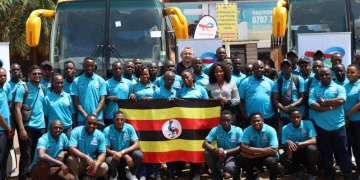
Ethiopia and Uganda have concluded a high-level meeting in the Ethiopian capital, Addis Ababa, with the signing of eight bilateral cooperation agreements. The deals span a variety of sectors, signalling a significant deepening of relations between the two East African nations.
The agreements, signed at the end of the fourth session of the Ethiopia-Uganda Joint Ministerial Commission (JMC) on Friday, cover areas including aviation, minerals, water resources, and agriculture.
Uganda’s delegation to the two-day talks was led by Foreign Minister General Odongo Jeje Abubakhar. He was accompanied by several other ministers, including those responsible for trade, industry and cooperatives, transport, agriculture, and internal affairs.
Ethiopia’s delegation was headed by its Foreign Minister, Dr Gedion Timothewos. Also present were the ministers for trade and regional integration, and other senior government officials and business leaders.
In his opening remarks, Dr Timothewos welcomed the Ugandan delegation and expressed Ethiopia’s pleasure in hosting the JMC meeting. He voiced his optimism that the commission would serve as an important platform to review existing ties and further strengthen cooperation for the mutual benefit of both Ethiopian and Ugandan citizens.
Dr Timothewos also highlighted the critical need for enhanced regional collaboration to effectively address the growing challenges facing both countries. He specifically acknowledged the strong partnership between Ethiopia and Uganda in ensuring the fair and sustainable use of the Nile waters.
Furthermore, the Ethiopian Foreign Minister underscored the importance of joint efforts and coordination between Ethiopia and Uganda in the fight against terrorism within the region, emphasising the need to work closely with the Intergovernmental Authority on Development (IGAD), the East African bloc.
Speaking on behalf of the Ugandan delegation, General Odongo Jeje Abubakhar expressed his gratitude to the Ethiopian side for their warm welcome. He noted that the fourth session of the JMC was taking place at a time when the bilateral relationship between the two countries had “blossomed and flourished” since its establishment many years ago.
General Odongo also pointed out that the six-year gap since the last JMC meeting had not diminished the commitment of either nation to maintain relations that are “alive, vibrant and productive”.
“This commitment was exemplified in the various high level exchange of visits between Addis Ababa and Kampala including at the highest levels, ongoing bilateral engagements in different sectors, and constant interactions in other regional and international fora,” General Odongo stated.
He reaffirmed the Ugandan government’s strong commitment to its relationship with Ethiopia, adding that this JMC would serve as “the latest building block to propel the bilateral relations to greater heights and provide an opportunity to explore and agree on many areas of cooperation.”

General Odongo highlighted the broad range of issues that bring the two countries together, which formed the basis of discussions during the JMC session. These included diplomatic consultations, the management of shared water resources, regional peace and security, trade, energy, immigration, tourism, agriculture, and transport.
The culmination of the two-day meeting was the signing of eight Memoranda of Understanding (MoUs) covering the following areas:
Bilateral Air Services Agreement
MoU on Industrial Cooperation
MoU on Cooperation in the Energy Sector
MoU on Water Resource Management
MoU on Technical Cooperation in Agriculture, Animal Industry and Fisheries
MoU on Cooperation in Aviation Training
MoU on Cooperation and Assistance in Aircraft Accident and Incident Investigation
MoU on Trade Cooperation
Both Foreign Ministers expressed their respective governments’ readiness and determination to implement all the agreed outcomes of the fourth session of the JMC, with the aim of elevating the bilateral relationship to a new level.










Discussion about this post